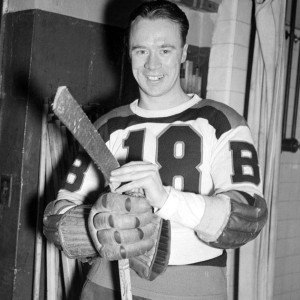Every few years in the NHL playoffs, an unsuspecting lower line player turns in a performance for the ages to lead his team on a deep playoff run. Whether it’s lightning in a bottle, stepping up for an injured player, or promotion to a higher line, these guys went from grinder to hero overnight.
I’m not talking about the Claude Lemieuxs or Butch Gorings of the world. Lemieux led the NHL playoffs in goals twice, won a Conn Smythe, and four Stanley Cups. He certainly raised his game in the playoffs, but was a strong regular season performer with four 60 point campaigns to his credit.
Acquired by the Islanders at the deadline in the 1979-80 season, Goring went on to be arguably the best deadline addition of all time. His acquisition began a run of four straight Stanley Cup championships after the Islanders had led the Campbell Conference in points two years in a row, but never made the Finals. He also won a Conn Smythe in 1980-81. However, he put up over 600 points in his career in LA before coming to the Islanders.
No, I’m talking about the guys who nobody could have seen coming. Here are the top five:
5. Mel Hill, Boston Bruins, 1938-39

Unless you’re a hardcore Bruins fan, chances are you’ve never heard of Mel Hill. He was a right winger who was a veteran of 8 full NHL seasons, and was out of the league by the time he was 31 years old. He had a career high of 44 points in 1942-43, which was very good for those days, but will always be remembered for his heroics in 1939.
In 1939, Hill set an NHL record that will likely never be broken again. In the semifinals against the New York Rangers, Hill scored an unbelievable three overtime game winning goals en route to a 7 game series win. His goals came in Games 1, 2, and 7, with the first and last being scored in triple overtime sandwiched between a single overtime game winner.
From that point on, he was known to Boston fans as “Sudden Death” Mel Hill. He finished those playoffs with six goals and nine total points, good for 2nd and 4th in the playoffs overall.
4. John Druce, Washington Capitals, 1989-90

The 1989-90 Capitals were Dino Cicarelli’s team. He was their best player and highest scorer, but when he went down with a knee injury in the playoffs, a void was left on their top line alongside Dale Hunter and Geoff Courtnall. Enter 4th liner John Druce.
Druce had 26 points in 93 career games to date, but caught fire when moved up the lineup in Washington. In the first round, he potted three goals (two game winners) in a six game victory over the Devils. In the second round, he caught fire and rattled off 9 goals, which included a hat trick and an overtime series clincher in Game 5 over the Rangers. At the time, that mark put him in a tie for third all-time for most goals in a single playoff series.
He was unable to recreate the same magic in the next round, as the Bruins swept the Capitals and Druce had two goals. He finished the playoffs with 14 goals and 17 total points. Those 17 points ended up being 74% of Druce’s career playoff point totals, despite being scored in only 28% of the games.
3. Cam Ward, Carolina Hurricanes, 2005-06

In Ward’s rookie season, he found himself firmly entrenched in the backup role behind starter Martin Gerber. In 28 games that season, he compiled an impressive 14-8-2 record, but had a GAA of 3.68 and save percentage of just .882. If you told Hurricanes fans that it would be Ward that led them to the promised land, they would have had you committed to the loony bin.
When Gerber struggled in their opening round series against the Canadiens, Cam Ward took his place and never looked back. He put the Hurricanes on his back and carried them all the way to a Stanley Cup championship. He posted a 2.14 GAA and .920 save percentage while picking up 15 of the 16 wins needed to win it all for the Canes.
Since then, Ward has been a solid starter in the NHL but has never seemed to live up to the expectations created for himself by that unbelievable run in 2006. The Hurricanes have made the playoffs just once since that run, though it was a run to the Conference Finals in 2008-09.
2. Ruslan Fedotenko, Tampa Bay Lightning, 2003-04
By the 2003-04 postseason, Fedotenko had established himself as a reliable 3rd liner who you could count on to chip in 30 points a season. But in the playoffs, his scoring had completely dried up. Before 2003-04, he contributed just three points over 22 games in three separate playoff runs.
That all changed in 2003-04 when Fedotenko exploded for 12 goals, tied for the most on the team with the eventual Conn Smythe winner, Brad Richards. Fedotenko saved his very best for the biggest moment possible: Game 7 of the Stanley Cup Final.
Fedotenko potted both of the goals the Lightning scored that night en route to a 2-1 win to bring the Cup to Tampa Bay for the first time.
1. Fernando Pisani, Edmonton Oilers, 2005-06

The 2005-06 Edmonton Oilers were the definition of a Cinderella Story, and Pisani was the posterboy. They entered the playoffs as the #8 seed and promptly defeated the Presidents’ Trophy winning Red Wings in six games. Down 2-0 heading into the 3rd period of Game 6, it was Pisani who scored two goals to start the rally for the Oilers. He finished the series with five goals.
In the second round, Pisani proved clutch again. The Oilers dispatched the Sharks in six games, with Pisani scoring another two goals, including the game winner, in Game 5. In the Western Conference Finals, Pisani added another two game winning goals as the Oilers punched their ticket to the Finals.
The goal winning game machine continued in the final round to help the Oilers stave off elimination. Down 3-1 in the series, Game 5 went into overtime with the Hurricanes on the power play. Pisani stole the puck at the opposing blueline, and rifled a shot past, ironically enough, Cam Ward for the win. It was the first time in Stanley Cup Finals history that an overtime goal had been scored shorthanded.
At home in Game 6, Pisani opened the scoring, which ended up being the game winner, as the Oilers won 4-0 and forced Game 7. In Game 7, the Hurricanes took a 2-0 lead before Pisani answered to make it 2-1. With three minutes left, Pisani appeared to have the game tying goal on his stick but was denied by Cam Ward with a beautiful save.
It wasn’t enough, as Cam Ward and the Hurricanes ended the Cinderella run of the Oilers. Pisani finished the playoffs with 14 goals and 5 game winners, both of which led the playoffs.
The Oilers rewarded him with a 4 year, $10M contract. In today’s cap dollars, that translates to about a 4 year, $16M deal. Pisani played five more seasons in the league, but never captured the magic that he had in the spring of 2006.